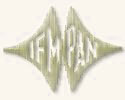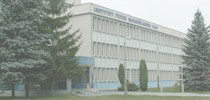

Konstantin V. Tretiakov
Research
-
-
Thematic scope of my scientific work concerns mainly statistical physics and computer simulations of many-body systems. Primarily, my scientific interests include topics related to the elastic properties of materials (particularly auxetic materials), the thermal conductivity of model systems, computer simulation methods, studies of nanoparticle systems, statistical mechanics of non-equilibrium systems, and the use of statistical distributions in studying the motility of cancer cells.
-
Elastic properties are one of the fundamental physical characteristics of materials. Intense technological development causes the need for new materials with previously unknown elastic properties, at the same time, generates new technical problems that can be solved using materials with specific, desired elastic properties. Auxetics are materials with a negative Poisson's ratio. Systems exhibiting anomalous (negative) Poisson's ratio behave in contrast to typical materials like rubber, glass, metals, etc. When stretching in one direction, an auxetic increases its size in transverse directions, and vice versa; when compressed, it decreases them. This unusual behavior of auxetic makes them exciting materials both from the point of view of basic research and the practical point of view.
-
Dynamic self-assembly (DySA) outside of thermodynamic equilibrium underlies many forms of adaptive and intelligent behaviors in natural and artificial systems. Despite increasing scientific interest in such systems, the fundamental principles governing DySA systems remain largely undeveloped. An important issue related to dynamic self-assembly in non-equilibrium systems is the search for new methods of describing these systems, which can help formulate a formalism of non-equilibrium statistical mechanics of systems away from thermodynamic equilibrium.
-
Researching heat transport phenomena in physical systems is a fundamental issue in physics. Controlling thermal transport at the nanoscale is a significant challenge in designing various devices at the nanoscale. My recent works on this topic concern heat transfer in model systems and were motivated by the need for a more profound understanding of heat transfer processes at the nanoscale.
-
Studying the statistical distributions of stochastic processes that can describe the movement of healthy and cancer cells is another essential element that can help in the fight against cancer. The analysis and description of the movement of cancer cells based on the theory of stochastic processes can reveal the possibility of reducing the ability of cancer cells to form metastases. The theoretical description of the movement of cancer cells may allow us to understand the essence of his strategy and help to model the movement of cancer cells and healthy cells.
-
In most of my research, computer simulations using molecular dynamics (MD) and Monte Carlo (MC) methods constituted the primary research technique. The development of simulation methods is an essential aspect of many research fields. My research in this area related to computer simulation methods concerns determining elastic properties using computer simulations and studying pseudo-random number generators.
-
The research of nanoparticle systems concerns a new class of nanostructured materials. It is devoted to modeling the kinetics of nanoparticle aggregation phenomena, especially on the surface adsorption of charged particles from which can be made photoconductors, showing photoconductivity and "inverse" photoconductivity.
Last Update: May 2023








